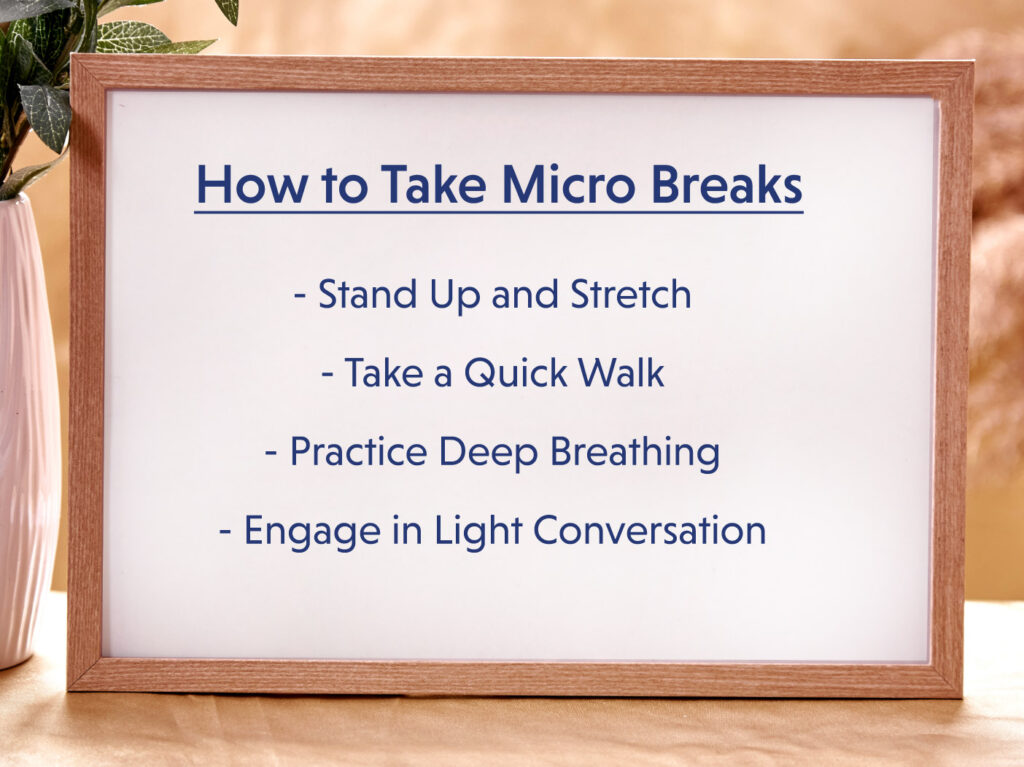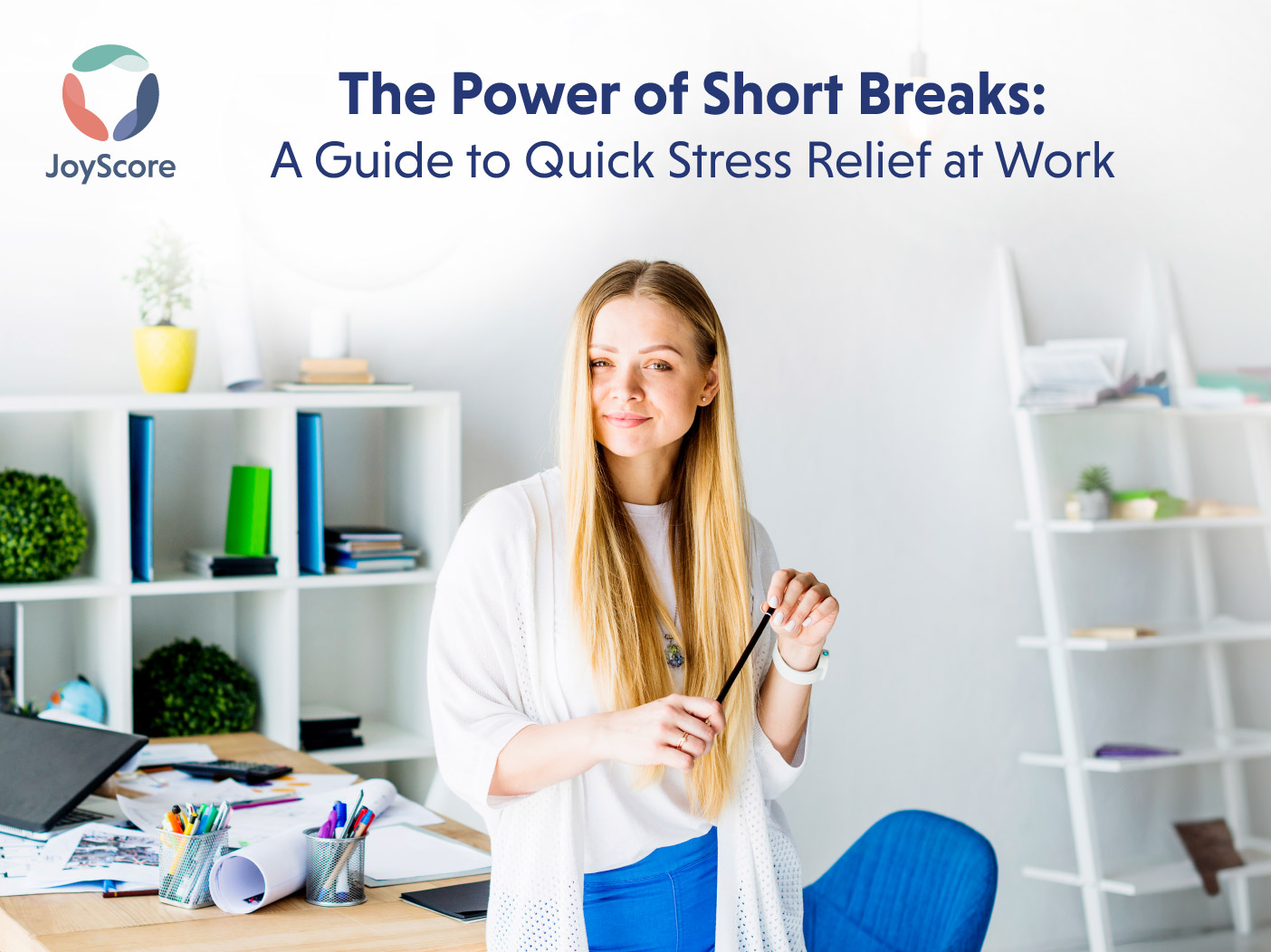Picture this: you’re at work, buried under a pile of tasks, feeling like you’re running on empty. Sound familiar? Amid the daily grind, we often forget the importance of taking breaks. But what if I told you that even just a few moments of taking the time to pause could make a world of difference? Enter the world of micro-breaks – those short, sweet timeouts that can rejuvenate your mind and body in the blink of an eye.
Introduction to Micro Breaks at Work
Short breaks during work aren’t only about taking a breather; they play a crucial role in looking after your mental well-being and job performance. Microbreaks, in particular, are incredibly helpful in combating mental fatigue, keeping you sharp, and making sure you’re happy at your job. When you organize them well, these short breaks can even enhance your creativity, problem-solving skills, and ability to make decisions.
The Importance of Short Breaks
Short breaks during work aren’t merely about physical rest; they play a pivotal role in safeguarding mental well-being and sustaining productivity. Specifically, micro breaks, brief intervals interspersed throughout the workday, serve as potent tools for combating mental fatigue, enhancing alertness, and fostering job contentment. When strategically integrated, these pauses serve as catalysts for creativity, sharpening problem-solving acumen, and refining decision-making prowess. By affording moments of respite, they replenish cognitive resources, revitalizing individuals to navigate challenges with renewed vigor, ultimately contributing to a more fulfilling and effective work experience.
How to Take Micro Breaks

Taking micro-breaks throughout your workday is a simple yet effective way to recharge and boost productivity. Here’s how you can seamlessly incorporate these brief respites into your routine:
1. Stand Up and Stretch: Incorporate regular stretching sessions into your schedule, aiming for a brief stretch every 30 minutes if you can. This not only relieves the strain on your eyes if you work on a computer for work but also alleviates any discomfort in your muscles and joints caused by prolonged sitting. Simple stretches like reaching for the sky or twisting your torso can work wonders.
2. Take a Quick Walk: Schedule short walks into your day, whether it’s a stroll around the office or a visit to the break room for a healthy snack or cup of water. These brief jaunts not only give your body a break from sitting but also provide a mental reset, allowing you to return to your tasks with renewed focus and clarity.
3. Practice Deep Breathing: Harness the power of deep breathing exercises to unwind and de-stress right at your desk. Pause for a moment and breathe in deeply through your nose, then breathe out slowly through your mouth. This simple practice can promote relaxation and help alleviate any tension or anxiety you may be experiencing.
4. Engage in Light Conversation: Taking advantage of opportunities to engage in casual conversations with colleagues about non-work-related topics is great for your mental health at the workplace too. Whether it’s discussing weekend plans or sharing funny anecdotes, these brief interactions provide a welcome break from work and foster a sense of camaraderie among team members.
By integrating these micro-breaks into your daily routine, you can enhance your well-being, boost productivity, and maintain a healthy work-life balance.
Break Frequency: How Often Should You Take a Micro Break?

Taking micro-breaks varies from person to person and depends on your job. But generally, experts recommend taking a short break every 60-90 minutes. This is because research has found that our brains can’t stay focused for longer than that without our performance dropping. So, by taking regular breaks, we can keep our minds fresh and maintain better productivity. It’s like giving your brain a chance to recharge so you can keep doing your best work. So, listen to your body and take those quick breaks when you need them—it can really make a difference in how well you do your job and your quality of life!
Building Your Routine of Micro Work Breaks
Building a routine for micro work breaks is essential for reaping their full benefits. Here are some tips:
1. Set a timer: Use a clock or phone alarm to remind yourself to take a short break every 60 to 90 minutes. This helps you remember to step away from your work regularly.
2. Plan your breaks: Try to take your breaks in between tasks at work. This way, you won’t interrupt your concentration during important work moments.
3. Be consistent: Make it a habit to take breaks at the same time every day. Consistency helps your body and mind get used to the routine, making it easier to take breaks without forgetting or feeling guilty.
The Benefits of Short Breaks
1. Reduced fatigue: Regular short breaks prevent both mental and physical fatigue by allowing your mind and body to recharge, ensuring you stay alert and focused throughout the day.
2. Improved productivity: Taking short breaks helps reset your concentration, enabling you to approach tasks with renewed energy and clarity, ultimately leading to higher productivity and better quality work.
3. Better health: Incorporating regular short breaks, particularly those involving physical activity like stretching or walking, supports overall physical well-being by reducing the risk of sedentary-related health issues and promoting circulation.
4. Enhanced creativity: Pausing from a task provides your subconscious mind with the opportunity to process information in the background, fostering creative insights and innovative solutions.
Conclusion
Despite their brevity, short breaks can have a significant impact on your productivity, mental health, and overall job satisfaction. By regularly incorporating these quick pauses into your workday, you can improve your performance, reduce stress, and maintain your health. So, whether it’s a quick stretch, a short walk, or a few minutes of deep breathing, don’t underestimate the power of a short break!
In the words of a renowned productivity expert, “You don’t work more to be more productive; you work smarter to be more productive.” Sometimes, working smarter means taking a break.



